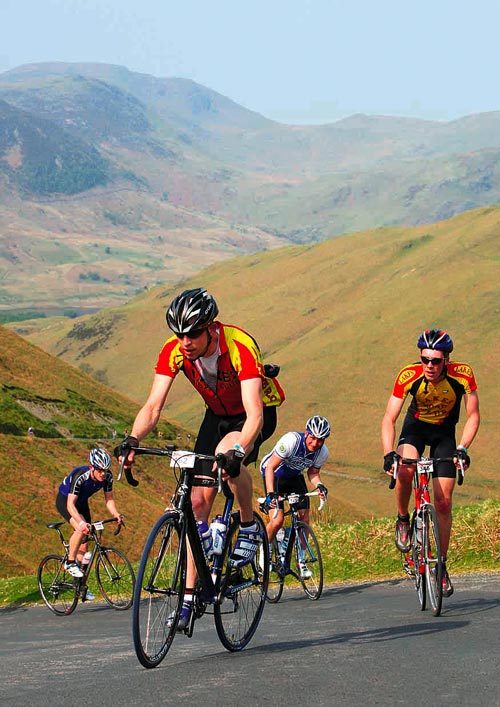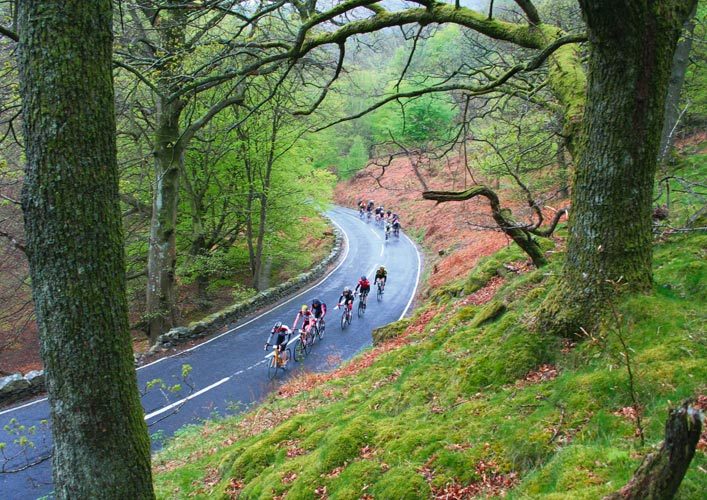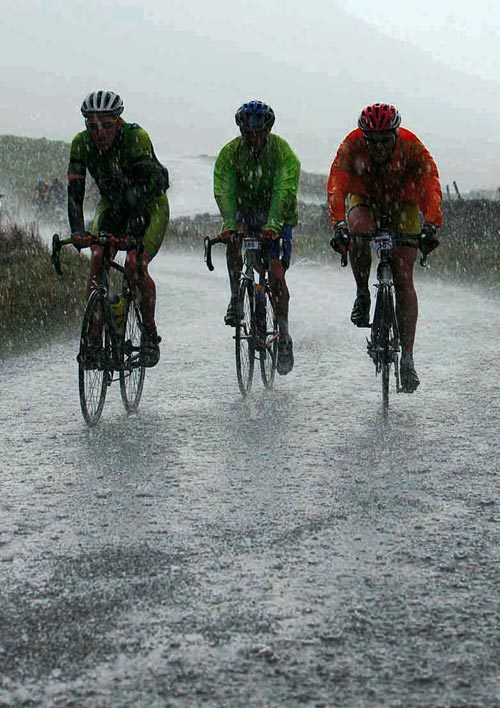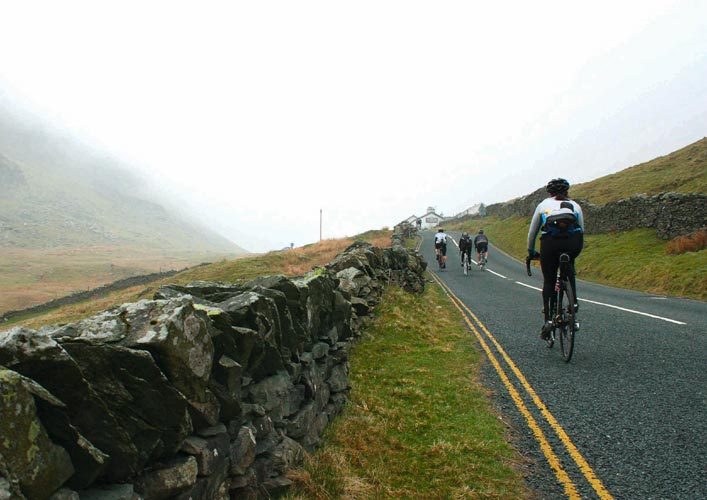Cyclo-sportive: Fred Whitton Challenge

The latest race content, interviews, features, reviews and expert buying guides, direct to your inbox!
You are now subscribed
Your newsletter sign-up was successful
DISTANCE 112 miles (180km)
MAIN CLIMBThe one-in-three slopes of Hardknott Pass
TOTAL CLIMB3,800m
ACHTUNG!Very steep, winding descent off Hardknott
The Fred Whitton is something of a classic in the sportive calendar. Now in its ninth year, it follows a challenging route around the Lake District, taking in all of the major mountain passes. Entries this year were extended to 1,000 riders, and with fine weather in the week leading up to the event, and on the day itself, the turnout was good, with over 800 riders completing the course.
The start is open from 6am to 9am, with riders unfamiliar with the route encouraged to start early to avoid missing the cut-off point at the first feed station in Buttermere at 12 o’clock.
Having completed the course last year for the first time, I was keen to return this year to repeat the experience, hopefully shedding some time from my previous result in the process. I opted to start at 7am to avoid getting up too early, but also to avoid any congestion on the route later in the afternoon.
The latest race content, interviews, features, reviews and expert buying guides, direct to your inbox!
The forecast was for hot humid conditions so the cooler morning air would also be an advantage. The disadvantage of this strategy was that there would be fewer riders on the road to work with in a group.
I was keen to start steady but strong and passed a number of groups and riders up the shortish climb of Hawkshead Hill and on the way to the Kirkstone Pass. The early morning mist was still sitting in the valleys and I was still feeling fresh enough to admire the spectacular scenery.
About halfway up the Kirkstone Pass, a flash Pinarello came past and I decided to hook on to the wheel. The pace was a bit too quick, especially when plummeting down the north side of the pass, so some familiarity with the route proved useful. However, I was keen to stay on this chap’s wheel so we could work together on the flatter sections along the edge of Ullswater and was glad to be on my race bike so that I could squeeze out a few extra mph.
Up Matterdale I was struggling, but he said I could hold on to his wheel, which I did. This meant that we could work together all the way through Kendal along Derwent to the foot of Honister Pass. Here I was really feeling the speed and miles in my legs and did not want to cook myself too early on the route. He gently slipped away up the climb and I adopted a less searing pace.
The summit of Honister Pass is quite a bleak location; even on a sunny day the grey rock and scree form an imposing backdrop. Dropping down from the summit on the winding road over the narrow stone bridge, I headed to the first food stop and time-check at Buttermere.
I filled the bottles and loaded up with food from the great selection of hearty fare available: malt loaf, ham rolls, bananas, fruit bars, etc. Sadly there was no time to relax today — Newlands Pass was calling.

Animal crackers
Setting off up Newlands I encountered a herd of cows being reluctantly shepherded up the pass by a farmer on his tractor, with a sheep dog energetically keeping them under control. I bid a friendly hello and passed them, keeping to the road’s edge.
The route after Newlands leads almost straight up Winlatter — this is a much greener climb through some thick pine forests and not so brutally steep. By this time of the day the supporters were really out in force, taking advantage of the peaceful shaded areas to have picnics and watch the riders sweat their way up the climb.
From here on the route heads into the surrounding hills of the Lakes, round the back of Lowswater, Ennerdale and over Cold Fell to the second food stop at Calder Bridge. The signage is clear for the whole route and the addition of marshals at the key junctions makes it even better. I found myself riding solo for this whole section, trying to recover from the early high pace. It was very tranquil with few other riders or cars on the roads, but now I had empty bottles and required a second refuelling. Again there was a welcome selection of refreshments. Not being able to stomach sandwiches, I availed myself of a banana and a fruit bar.
If you know the route, then from here on in there is really only one thing on your mind: Hardknott Pass. You get a few glimpses of the hills that this road is stuck to from about five miles away, and I made a serious attempt to ease off the pace and get some energy bars, drink and gels down my neck. At about 95 miles into the route there is a sustained climb rising over 300m in little over a mile. It starts with sections of one-in-three and then one-in-four the minute you pass over the little bridge at the foot of the climb. It’s winding and unforgiving until you reach the old Roman fort where things ease back a little — this is your recovery section, and I went slowly to save my strength.
Some riders use a standard 39x25, but unless you are super strong, a compact or even a triple is your best bet to get up without pushing; my 34x26 did the job.

Pain relief
As you reach the top section, spectators sit on the boulders strewn by the roadside looking down on you, shouting encouragement, applauding. I was determined not to walk. Then the crux of the route, a straight one-in-three section with no hairpins to zig-zag around. You cannot stay in the saddle without fighting to keep the front wheel on the ground; you are literally forced to stand and pull on the handlebars.
Finally it’s over. Well, for about a minute.
And before you know it, you are thrown over the edge on the most technical descent of the whole route, even steeper than the ascent but with a series of short, sharp hairpins. The inside line is so steep the tarmac is scored with past wounds caused by cars attempting this road. In many parts it seems that even the tarmac is having difficulty holding on, with some large corrugated sections, which makes braking a very delicate game as the rear wheel locks and releases.
Soon it’s finished, and as you pass over the bridge at the head of the Duddon Valley you have a couple of minutes to relax as you approach the looming Wrynose Pass. Although steep it is not as sustained as Hardknott and you know it is the last serious climb of the day. The descent is steep and long but much straighter, with good views of the road ahead. It’s a game of how tight can you hold on over the uneven surface before your nerves get the better of you and you reach for the brakes.
From here on the route is straightforward with pleasant undulating lanes before climbing up to the top of the Coniston Valley. Then it’s just a case of head down and head for home. There was quite a crowd at the finish and the applause felt well earned, it was certainly very good to end. The pain of the day quickly sunk away and a grin glued itself to my face — I had taken nearly an hour off my time from the previous year.
The dry, warm conditions this year helped to see a number of really quick times, with five riders coming home in under six hours. The quickest time of the day and in the event’s history went jointly to James Dobbin and Robert Jebb, who finished in an incredible five hours 40 minutes.
The route is an undoubted classic and the organisation is excellent. There’s a real feeling of community involvement every time you stop at the food stations, or get cheered on by the supporters along the way. Clearly there are good reasons why this event fills up so quickly!

WANT TO RIDE IT?
If you fancy riding the Fred Whitton Challenge, keep an eye on the event’s website, at www.fredwhittonchallenge.org.uk. It features all the salient details including route map and ride results.
Founded in 1891, Cycling Weekly and its team of expert journalists brings cyclists in-depth reviews, extensive coverage of both professional and domestic racing, as well as fitness advice and 'brew a cuppa and put your feet up' features. Cycling Weekly serves its audience across a range of platforms, from good old-fashioned print to online journalism, and video.